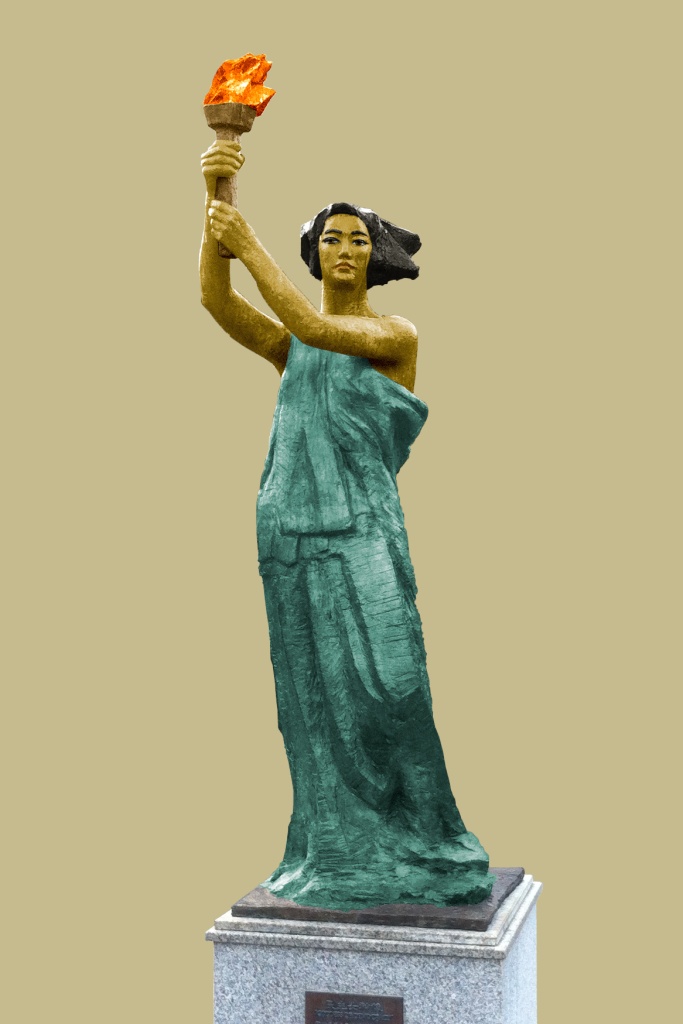
Mínzhǔ Nǚshén.
(The image above derives from a photo of the Goddess of Democracy in San Francisco.)
Now more than ever, hail to the Goddess of Democracy! May she endure and thrive, and may her blessings be upon all the peoples of the earth.

Now more than ever, hail to the Goddess of Democracy! May she endure and thrive, and may her blessings be upon all the peoples of the earth.
The covid-19 pandemic has had many unexpected consequences. One of them for me has been that I found myself listening to more music from the 1990s. Working from home, I didn’t want to strain my occasionally temperamental wifi; I therefore switched from streaming music while I work to listening to old CDs, exhumed from my basement for the purpose.
One such album is Anam by Clannad. The disc has probably been in my possession for roughly 30 years, so it is impressive that it still works. If you haven’t given it a listen in a few decades, this was an era when (I’m guessing) Clannad knew that commercial success was in their grasp but weren’t fully confident that a neo-traditional or New Age sound would suffice for the mass market. As a result, there is a mix of forgettable ’80s-influenced synth pop and other elements along with their more familiar recipe of ethereal vocals backed by traditional instruments. But their classic New Age style does typify the two best tracks on the album, in my opinion, namely “Harry’s Game” and “The Poison Glen”. Both are songs you might recognize. For “The Poison Glen”, the song that prompts the present post, Moya Brennan is the vocalist, though all four band members are credited as writing this song.
What strikes me listening to it now is how perfectly “The Poison Glen” encapsulates both a certain spirit of New Age paganism as it developed in the ’90s and after, and how—in an alternate universe—it just as easily might have encapsulated a completely different approach to paganism. Along with Enya, Clannad helped define New Age music, and New Age æsthetics helped define the nascent American paganism of that period. Every bookshop in those days had a section of New Age titles, published by Llewellyn and the like, on astrology, earth-based religion, Wicca, so-called shamanism, and women’s spirituality: all were easily accessible on the same shelves, while “Orinoco Flow” or “Against the Wind” might well be playing on commercial radio as you browsed. New Age paganism, in other words, was both accessible and marketable. I myself bought my first ogam set, complete with warmed-over Robert Graves-y exegesis, from such a setting, along with any number of wide-eyed works about the Culdees, Jungian archetypes, or magick with a K. The lesson a young person like me took back then was that paganism was a lifestyle choice, precisely as valid and as fungible as the dollars we used to buy our various New Age goods. Put on a disc (yours for $12!), and you could immerse yourself in the mists of mystical experience. Anybody anywhere could tap into this spirit at will.
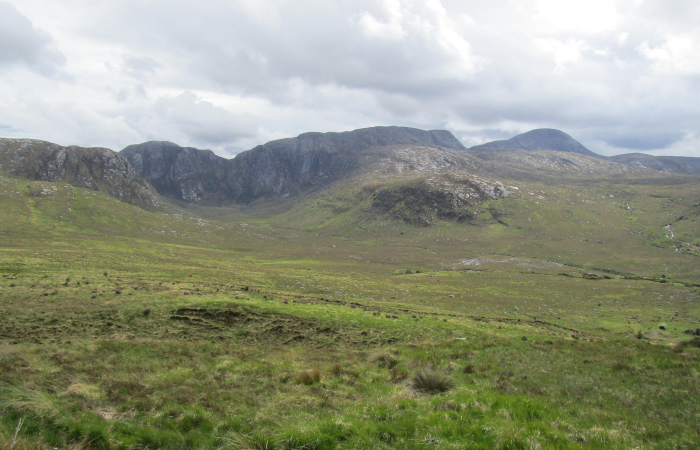
Yet the Poisoned Glen is a real place. I have been there. I have seen the “misty mountain” that Moya Brennan is singing about, both sunlit and cloaked in cloud, and felt something like the “haunted echo” of struggles from ancient days. During a roughly 20-year period when I had forgotten about the song’s existence, I visited County Donegal and even stayed in Gweedore—the Brennans’ own stomping ground. I paid particular attention to the Poisoned Glen because, poking around in a translation of the Dindshenchas, I had been reading of its mythical significance, ‘poisoned’ as it was said to have been by Balor’s noxious evil eye once Lugh Lámhfhada knocked it out of Balor’s head. It is a beautiful valley, but there’s no mistaking a certain ineffable something clinging to the landscape. I didn’t sense that the dead there were as unquiet as those at the battlefield of Antietam, for example, but its landscape and history were nevertheless somehow marked—awful and sublime. It is one of those “cathedrals of nature” that tend to impress themselves upon the traveller.
Clannad, who of course know the history and mythology of the area far better than I do, are actually walking us through a dawning realization like this in their successive verses. Moya first sings that she is “feeling something from long ago”, then specifies “spirits from long ago” in the next stanza before reaching a peak of “everything from long ago”: in other words, the totality of the history, the mythology, the feel of the place. Lest anyone miss the hint, the lyrics reference “an old legend of a mythical hero” as well as those “spirits” that have left their mark on the valley.
In the ’90s, all that my adolescent self took from this song was a sensibility of ‘Celtic mist’—generic stirrings of the archetypal soul. That feeling meant something to me then, but it was a shallow and self-willed something, almost opposite to the “divine terror” that one feels when truly and viscerally confronted with the sacred. Listening to it today, I realize that “The Poison Glen” is equally susceptible of being read as a call to attend to the specificities of place, of history, of narrative. After all, pilgrimage matters because the sacred site has a spirit all its own; and of course, one’s journey there matters as well—one’s experience of being there, of coming to terms with what one feels there. Listening now, it seems like a wonder that I, and no doubt others of my generation, missed that point. In the early ’90s, I was capable of listening to this song without inquiring where the Poisoned Glen was or what made it special. Of course, back then the internet wouldn’t have had many answers—even if I had thought to dial up and try my luck on WebCrawler or Ask Jeeves!
It has been quite a while since I posted on this blog, but I have not been (entirely) idle. I’d like to highlight a number of things I’ve been working on regarding Gallo-Roman religion. In reverse chronological order order, these are a new page on DeoMercurio.be regarding syncretism in Gallo-Roman religion, another page on the Matronæ Aufaniæ, a presentation on Romanization available on YouTube, and even an appearance on the GaulCast podcast.
My new page on syncretism (version française, English version) is one I’ve been tinkering with for a good year and a half. My discussions with various people in the Gaulish polytheist community, particularly on Discord, brought home to me how difficult and complex a topic this can be. I therefore set out to write a kind of introductory overview—and found myself instead laying out a typology of syncretism, interpretatio, and related phenomena, with introductory and concluding overviews of relevant historical and social considerations. One of the most important points on the page, in my opinion, well illustrates the general complexity of the topic: “It is paradoxical but true that names of the type ‘god X of place Y’ at once insist on the identity of the deity as X and on the differentiation between the X found in place Y from other forms of X that may be encountered elsewhere.” This point applies, among others, to deities with names along the lines of Mercurius Bigentius ‘Mercury of Piesport’, Mercurius Aruernus ‘Mercury of the Auvergne’, and Mercurius Cimbrianus ‘Mercury of the Cimbri’, to say nothing of many other such instances beyond Gaul.
While my syncretism page was largely a solo effort (albeit with copious input from others from both Forum Gallicum and Mantalon Bolgon), I’m very pleased to have published the first jointly authored page on DeoMercurio.be. From the start, I had hoped the site might spark collaborative interest, so I was very happy to host a joint contribution between Cassanâ Suniciâ Sigroni, Āgiknos Ianau̯anākos (both fellow members of Mantalon Bolgon), and myself regarding the Matronæ Aufaniæ: version française, English version. The Matronæ are some of the most belovèd Gallo-Roman goddesses, and the Aufaniæ were historically among the popular of Matronæ. The Aufaniæ page began life as a series of discussions on the Mantalon Bolgon Discord server, which I compiled into a single document, with input from my fellow-authors, so as to assemble our ideas in one place. For now, this page takes the place of a more general overview on Matronæ in Gaul (though I still have some hopes of making that happen as well; however, I am keenly aware of the limits of my expertise when it comes to the myriad Germanic epithets of the Matronæ).
Partly covering similar ground to the syncretism page—though in a different medium and with an ultimately different scope—was a presentation on Romanization and Gallo-Roman religion that I gave in the November 2021 edition of the Comreton Calleios (an excellent institution, and one that I hope continues to go from strength to strength). Cunobelinus Betullicnos had asked me to put together a primer on Romanization, covering topics such as administration and cultural changes to give a broader context for Gallo-Roman religion. To do justice to the subject, I felt I had to clear the air of certain misconceptions common among English-speaking Gaulish polytheists, but I hope the overall effect is informative and at times even entertaining. The video is available here (in English with French subtitles). Both Leton Bebronâs and Cunobelinus Betullicnos of Forum Gallicum made excellent contributions and suggestions that improved the piece.
Finally, I was truly delighted to appear on the GaulCast podcast last September to discuss regional variation in Gaulish religion. I’m grateful to Runosagiton and Artocatos for inviting me on, as well as to my fellow-guest Lucotillâ Gianoglannatis for a genuinely lovely conversation. Episode 10 is available available here as well as on Spotify and other purveyors of fine podcasts.
So here’s me, all wondering what I ought to think about the prospect of getting LASIK surgery, not knowing whether I should trust myself to these mysterious lasers and throwing away so much money all in one place. I do some divination, and I’m like, “Yo, deities. If this is a terrible idea or whatever, just go ahead and let me know. Don’t spare my feelings. My proposal’s to get LASIK, but if I ought to change my mind and endure having annoying glass-and-metal contraptions on my face forever, I’m open to that too.”
So then I cast my astragaloi (knuckle-bones, in my case of white-tailed deer), and decode the message, and lo and behold, it comes back as follows: “Of the martial Minerva (ΑΘΗΝΑΣ ΑΡΕΙΑΣ). If four Chians (i.e. ones) and one three are cast, the god signals: ‘By avoiding enmity and animosity, you will reach your prize; you will arrive and the blue-eyed goddess Minerva will save you. The activity that you have in mind will turn out as you wish it.”
I thought that was an awfully positive signal, and I was keenly grateful to enlist the support of Minerva, because, I mean, wisdom—strategems—foresight—courage, I can has?
I therefore gratefully dedicate to Minerva the following votive sonnet:
Unwoven threads, a jumble, tell no tale
and limn no image to delight the mind;
dissolved, the elements cannot but fail
to form a structure, or as one to bind—
but as the chaos ere the world was made,
without a plan or scheme must aimless flow,
dissolve, disperse, insensibly then fade,
and leave untried its chance to join and grow.
’Tis thine, Minerva, such parts to interweave—
to let thy matchless wisdom pick and shed
and batten beauty, tangled bedlam cleave,
and craft divine blessings widely spread.
Let all the elements know thy expert hand
and come together true at thy command.
Attentive readers of this blog may already have picked up on the fact that Mercury is my patron deity, so I need no particular excuse to include him in my suite of votive sonnets in the event that my LASIK surgery was a success. What’s more, however, the particular divinatory instrument that I was using to gage whether I ought to go ahead with the procedure is specially dedicated to Hermes according to some of the Anatolian inscriptions from which it’s known. I refer to Hellenistic astragalomancy (which I practise using the knuckle-bones of a white-tailed deer that I ordered from Etsy from somebody in Utah or thereabouts who seemed to have plenty of unwanted deer knuckle-bones lying about…).
This is (of course!) the most tongue-in-cheek and self-referential of the sonnets I’ve written for this purpose. I present it to my readers today (Wednesday, the day of Mercury) in the hope that they, like the deity to whom it was offered, won’t find it too contemptible for their perusal.
Thy votary, by troubles laden down,
from anxious doubts humbly seeks relief,
to thee offering gesture, verb, and noun,
a wisp of frankincense, an oaken leaf—
as if to render visible internal grief
and place before the god an earnest note
to buy the loyalty of the sainted thief
(contented, dare we think, with so mean a groat).
But nay, the lusty nuncio with cock and goat
unstintingly bestows, with merry laugh,
abundant gifts to keep his throng afloat
and flits away, in hand his serpent staff.
Thus behind unnumbered successful schemes
the eye of Mercury sneakily gleams.
The archæological evidence (notably at Pommern) indicates that some, at least, of the ancient worshippers of Lenus Mars considered his intervention efficacious in health matters. Many warrior deities in Gaul double as health deities, partly for the same reason that we all talk about ‘battling disease’ or ‘being a fighter’ against cancer or whatever, and partly because inflicting, avoiding, and recovering from injury are of course so central to the business of battle.
For the perhaps inadequate reason that I simply couldn’t stand glasses and contacts anymore, I decided to get LASIK surgery. It’s the first and only elective surgery I’ve ever had, and I naturally gave it very serious thought. The divinatory signals I got were very favourable, and I vowed devotional sonnets, if all went well, to Lenus Mars, Mercury, and Minerva. For the first I wrote a Petrarchan, for the second a Spenserian, and for the third a Shakespearean sonnet. It’s been a long time since I’ve written sonnets of any description, and I can’t claim that any of them are destined to undying fame, but I beg my readers’ indulgence for them all. Today (Tuesday, the day of Mars), I present my votive sonnet to Lenus Mars, the ‘bosky Mars’, healer and national protector of the Treveri.
As smiths the keenest weapons shape and hone
who know their plan and see their work most clear;
as archers aim their bolts so that they will not veer
and failing vision costs the chief his throne—
so sight the martial god presides o’er as his own.
In bygone days thy votaries with rheumy tear
as their sight with passing age began to blear,
O Lenus Mars, would look to thee alone.
So now I humbly pray thee, put to flight
the phantom foes that blur, obscure, and flash
and blind me save to colour, dark, and light.
Thy healing power use; thy endless might
exert, and my affliction from me dash.
An it please thee, restore me all my sight.
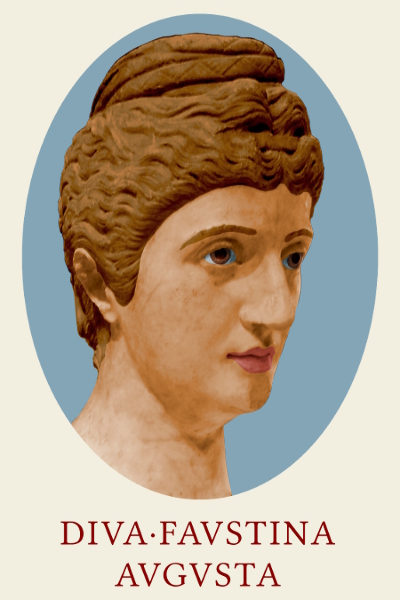
Polychrome version of the statue of the divine Faustina the Elder at Mt Holyoke.
Divine Faustina, august, eternal,
in you succeeding ages have saluted
a holy icon of women’s majesty.
Belovèd in life, belovèd in death,
on eagle’s wings borne to heaven,
eternal goddess forevermore,
your numen was adored by crowds,
your sacred image on a chariot drawn
by teams of elephants though Rome.
From countless pious people’s necks,
your likeness hung on sacred amulets.
Behold and give your blessing now,
I pray, divine, august Faustina,
to all the women who refuse
to be silent, who denounce the crimes
so long unjustly covered up,
and who now through your grace begin
to assume their rightful share of power.
Sustain their cause, divine Faustina,
and reveal to them the straightest way
to justice, dignity, and truth.
For this I thank you, goddess eternal,
and offer you this humble token.
DEAE · FAVSTINAE · AVGVSTAE · VIDVCVS · BRIGANTICI · V · S · L · M
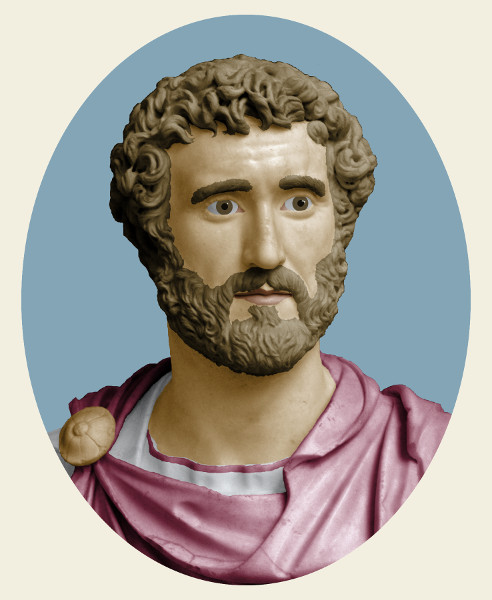
Bust of the divine Antoninus Pius in the Glyptothek in Munich. (This image is a derivative work of a photograph in the public domain)
Divine lord Antoninus, famed for pious deeds,
a second Numa living thou wert felt to be:
attuned to what is right, judicious, kindly, wise.
Thy course provides for humankind a guide
to good and upright governance for aye.
With clemency thou didst temper justice stern,
with moderation thine inherent majesty,
with magnanimity thy true magnificence.
Unto the heavens, pious prince, didst thou ascend
to take thy rightful place among the deathless gods
and thus rejoin thy much adored Faustina there.
As god and goddess side by side eternally,
I honor thee and her. O Pius, thanks are due
to thee for all the wonders thou hast brought to pass,
restoring partly this Republic’s dignity.
May thy beneficent influence yet shine on those
in whom the people freely place their confidence,
and turn the minds of all the magistrates of state
to justice, not to pelf, vanity, or petty pride.
Let not corruption, depraved intolerance,
contempt for truth, or naked inhumanity
prevail again as hitherto. May unfit guards
be guarded with a vigilance that never fails.
I therefore humbly offer thee this pious gift.
DIVO · ANTONINO · PIO · VIDVCVS · BRIGANTICI · V · S · L · M
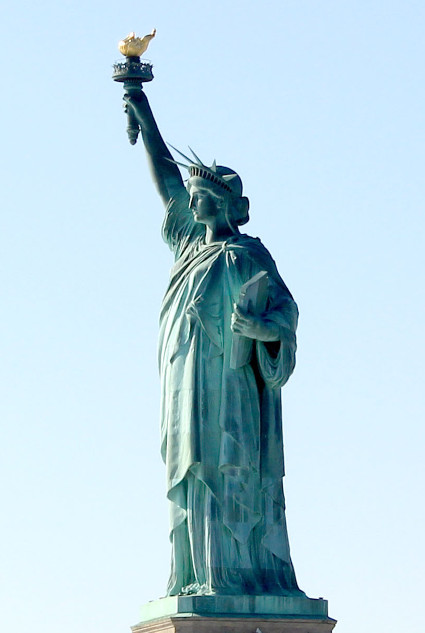
The most familiar depiction of the goddess Libertas in the United States. (This image is a derivative work of a photograph in the public domain)
To you, Liberty, were these states
in their infancy
dedicated—a solemn offering
in revolutionary times
by delegates anxious for what might be,
anxious to secure
the goodwill of Providence:
to you, Liberty, were their commonwealths
consecrated
and in you were they conceived.
Our every failure to secure for you
the freedom of the people
has been a debt incurred against you,
generous goddess—a debt
we must requite, or tremble
for the consequences.
Too long did slavery, the source
of misery to innocent millions
for toilsome centuries,
rebuke our nation’s insincerity,
and terrible was the wrath
of the avenging deities
exacted against the slaveholder and
the slaveholder’s every accomplice—
too long has freedom been
an empty promise
for millions of citizens.
Let us never fall away
from our dedication to you;
let us never waver in the earnestness
of our natal sacrifice.
Mighty goddess, stay not your hand
in scourging those powerful recreants
who would sin against you,
stealing children from their parents,
or shutting millions behind bars,
or depriving citizens of the franchise.
Strike quick
against your enemies, O goddess,
and save our commonwealth from worse
punishment in days to come.
Yours, immortal Liberty, is the torch
that lights the path for our republic;
yours the words that sing our destiny.
Your lofty tree roots deep in
the soil of Columbia;
beneath its shade may we rejoice
and feast forever upon its fruit.
I thank you, Liberty, for delivering
the house of the people from those
apostate to your divine grace.
Kindly accept my gifts,
my words of thanks,
my inexhaustible devotion.
DEAE · LIBERTATI · VIDVCVS · BRIGANTICI · V · S · L · M